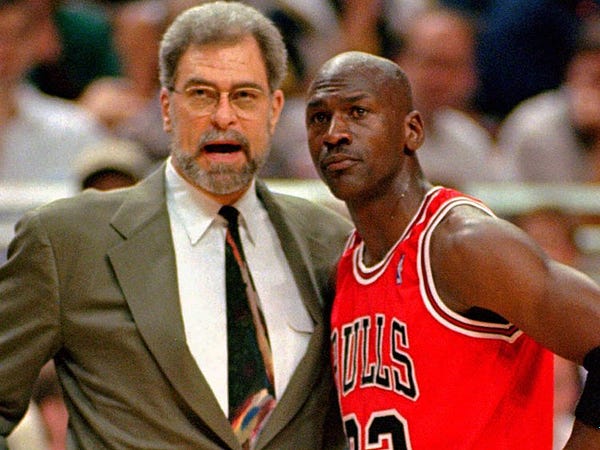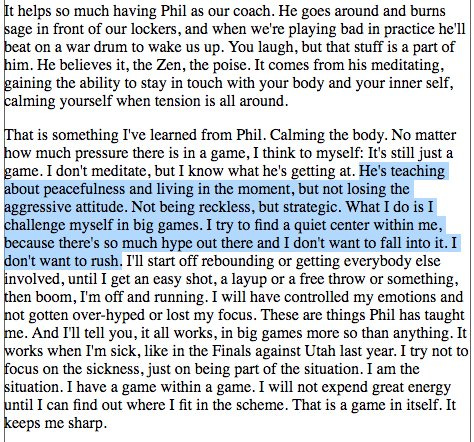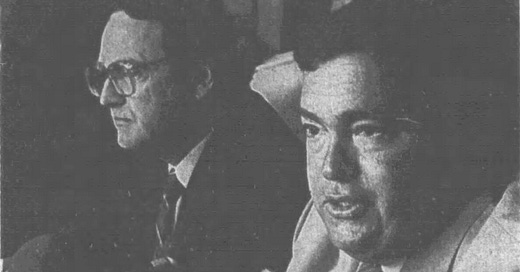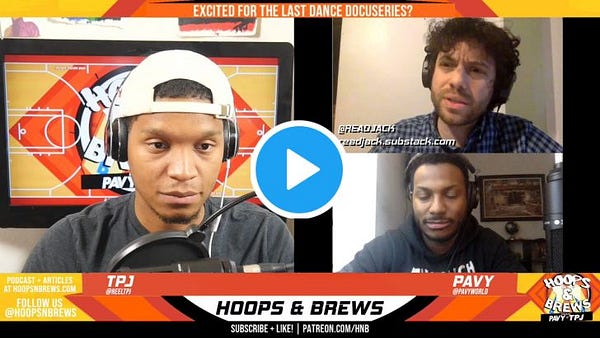The Central Mystery of "The Last Dance" is Jerry Reinsdorf
Jerry Reinsdorf is a loyal man. But why did he choose loyalty to Jerry Krause over loyalty to Michael Jordan?
“I don’t want to be the person that breaks up the Chicago Bulls as long as they’re winning championships.”
— Jerry Reinsdorf, Game 5, 1998 NBA Finals
It’s here.
The Last Dance.
The documentary series that will be, in the minds of many Bulls fans, the definitive account of the dynasty years kicks off tonight. More than 100 interviews, more than 500 hours of never-before-seen footage, more than 20 years in the making, all to answer one question:
Why did Jerry Reinsdorf choose loyalty to Jerry Krause over loyalty to Michael Jordan?
Maybe you have other questions, but I don’t.
That question is at the heart of the documentary. Just look at its title: The Last Dance.
That is the name that Phil Jackson gave to the 1997-98 season. His reason for assigning it stemmed from tensions between Krause and the dynasty’s three principles: MJ, Scottie and Phil.
These tensions were both long-simmering — such as Krause’s handling of Jordan’s foot injury in 1986 or his earmarking of $1.8 million for Italian league star Toni Kukoc when Scottie Pippen felt underpaid — and dangerously new, such as Krause trying to trade Pippen in 1994, 1995 and 1997, and banning Phil Jackson from the Berto Center in 1997 while Krause worked out draft prospects that the team would hypothetically net from a Pippen trade, because, to Krause’s mind, if the team traded Pippen, Phil would not return anyhow, and therefore should not be consulted about those draft picks.
But the last straw which drove the 1998 Bulls was Krause’s hard line on Phil being in a lame-duck season.
“I want to emphasize this will be his last year,” Krause said upon announcing that the Bulls were re-signing Phil to a one-year, $5.7 million deal, a three-million raise from his one-year deal for 1996-97.
His later quote, reported in David Halberstam’s Jordan biography “Playing For Keeps,” was more direct.
“I don’t care if it’s eighty-two and oh this year,” Krause told Phil before the ‘98 season, “you’re fucking gone.”
Phil used Krause’s obstinance as a battle cry, building an Us-vs.-Them vibe in the locker room, where Us was the team and Them was management. The Phil-Krause feud was so bad by ‘97-’98 that these two men who had built this team together were purposefully snubbing each other for Christmas presents.
The Us-vs.-Them with Krause and Reinsdorf — “The Jerrys,” as MJ called them — fueled Jordan’s discontent all season. And while Reinsdorf captured Jordan’s intellectual frustration, Krause caught his wrath.
“You see how Jerry Reinsdorf operates,” Jordan said during the ‘97-’98 preseason, when a reporter asked him if he would try to pressure Reinsdorf into re-signing Phil after the ‘98 season. “My influence doesn’t have anything to do with his decision-making.”
And if Jackson didn’t return?
“I would quit,” Jordan said.
Jordan held that line all year.
“Just change ownership,” Jordan told Rick Telander during the 1998 season about what he wanted for 1999. “And you know what I'd consider a change in ownership? Change the GM. Let Phil be general manager and coach. Krause? I don't want to start a war around here. I'll just say that sometimes it's tough working for an organization that doesn't show the same type of loyalty toward you as you show it.”
In July 1998, after the championship and after Phil was still technically the frontrunner for the 1999 head coaching job even though he’d cleaned out his office, Jordan again spoke in frustrated tones about the firewall between he and Reinsdorf, answering a reporter’s question about whether the Bulls hiring Iowa State coach Tim Floyd would be akin to pushing Jordan out of basketball.
“I think that’s exactly what it is,” Jordan said. “It’s very obvious that my feelings haven’t really been considered when they’ve made coaching decisions. Jerry (Reinsdorf has) always been a man of his own. He’s never really been influenced by too many people, and I wouldn’t expect him to be influenced by me. If that was the case, Phil wouldn’t ever have gone.”
And later:
“I don’t want to play for a college coach, and no, I don’t want to play for any other coach. I’ve always said that I want to play for Phil Jackson. That hasn’t changed. (Krause) made the stance on Phil Jackson, and that pretty much made the stance on me.”




Jerry’s choice: Krause or Jordan?
Let’s pause here and reflect on these items at play. We have simple facts. Jordan was on the record, repeatedly, that he would not return without Phil. Krause was on the record, repeatedly, that Phil would not return.
As I wrote after Jerry Krause passed away, no one person is responsible for the end of the Bulls run. Popular opinion holds Krause to blame. Phil seemed intent on leaving, even without Krause’s push. MJ tied himself to Phil — the great Sam Smith held Jordan primarily accountable. Scottie wanted the pay day he’d earned throughout the decade. It is not one person.
But when it comes to Krause, he’s got a boss, and that is Jerry Reinsdorf. So setting aside Phil’s pattern of behavior over his career that suggests he might well have left after ‘98 even if Krause had welcomed him back, let’s look at this scenario from Reinsdorf’s perspective. Because to me, he’s both the x-factor and the mystery.
Jordan is the league’s best player. Phil is the league’s best coach. Scottie is the league’s best perimeter defender (maybe the best defender overall) and the best #2 on a team. Dennis is the league’s best rebounder. Harp (#3 defender), Kerr (shooter) and Toni (6th man) are all among the best at what they do.
The Bulls epitomized the well-oiled machine, a remarkable 248-56 including the postseason from ‘96 to ‘98. On a year-to-year basis, they needed no overhauls — just tinkering. After winning the ‘96 title, Jerry Krause’s most significant personnel moves were signing Brian Williams in ‘97 to replace the injured Bill Wennington, and trading for Scott Burrell at the start of ‘98. As much as those guys played strong basketball, they combined in the playoffs for just 9.9 points and 5.7 rebounds.
In other words, if Jerry Reinsdorf fired Jerry Krause at the end of 1998, his new GM would simply have to hold the line. Maybe the team lets Rodman walk and scoops up Charles Barkley, but those are moves that Jordan and Pippen would facilitate as much as any general manager.
The question is: Why didn’t Reinsdorf just make that happen? Why, as I said, did he choose loyalty to Krause over loyalty to Jordan?
“I asked around the league, and everybody I talked to said, ‘Don’t touch the guy’ — he had a way of alienating people,” Reinsdorf explains in The Last Dance about his decision to hire Krause as GM in 1985. “But I wasn’t hiring somebody to win a personality contest. I wanted somebody who truly believed in building a team the way I wanted to. And Krause was the guy.”
So yes, Reinsdorf knew Krause was prickly. Everyone did. And Reinsdorf also loved championships. He viewed it as the purpose of owning a team.
“I made the decision,” Reinsdorf told Sam Smith in 1995. “As long as Michael is here we have to try to win and worry about what happens later.”
We know that ultimately, MJ wanted a chance to own a team, which he was not going to get in Chicago. But we also know that even before he was thinking about ownership or management, he just wanted to keep playing. In his press conference after the 1997 championship, he was unequivocal, detailed, and passionate:
“I think this team is entitled to an opportunity to continue to be successful. Sure, business has got to become involved. I’m not saying Jerry Reinsdorf is the richest guy in the world. I’m not saying that all of his partners can financially support what this team needs to maintain and be successful.
“But we’ve done a lot for this organization, and we are putting in a situation where it can be highly valuable. When I first came here … the Bulls team was worth probably $13 million. Fifteen, sixteen, seventeen million dollars. Now it’s worth (pause) $150 million. So the profits have been made over the years.
“What we gain now by trying to keep this team together and be successful will pay for six, seven, eight, ten years. There has to be some sense of consideration, some sense of loyalty, to myself, to Scottie, to Phil, even to the guys who have given themselves over the last two years (…)
“We are entitled to defend what we have until we lose it. If we lose it, then you look at it and say, ‘Okay, let’s change.’ Rebuilding? No one is guaranteeing that rebuilding is going to be two or three, four or five years. The Cubs have been rebuilding for 42 years. And that’s something you have to look at from a business aspect.
“So if you want to look at this (as) a business thing, have a sense of respect for the people who have laid the groundwork so that you can be a profitable organization. And I’m not trying to twist Jerry Reinsdorf’s arm. (pause) It sounds like it, though. (pause) But I would like to see us defend what we have attained over the last five out of seven years, which is a championship team. (…)
“I think we are entitled to defend what we have. And Phil should be the head coach. And I shouldn’t be put in a position to have to make a choice to play for another coach other than Phil Jackson. (…)
“For once, don’t look at the bottom line. Look at the joy of this night, and every night that we’ve won a championship, an enjoyment that you’ve put together an unbelievable organization that has been champions for five out of seven years.”
(Not) the last dance
Pretend, then, that Phil was determined to take a hiatus after 1998, just as he’d talked about in the mid-90s, just as he actually did after 1998, and again after 2004 with the Lakers. After 1997, instead of pursuing with Krause the exploration of the Pippen-Celtics rebuilding trade and hence doubling down on the bad blood between MJ/Pip/Phil and management, what if Reinsdorf had instead decided to tie his lot with Jordan?
What if he had called Michael into his office after the 5th championship, and said, “Let’s ride this out as far as it goes”? Michael would not have needed to tell him that Krause had to go — Jerry would have known that.
Imagine a Bulls franchise where Jerry tells Michael in the summer of 1997 that he is relieving Krause of his duties for the duration of the championship run. He tells Michael that he is going to keep bringing everyone back until they lose. He tells Michael that if Phil decides he wants a break, that Michael can help select the coach. He tells Michael, “You tell me when it’s over.”
Maybe they win in 1999 and maybe they don’t. Immediately after the ‘98 Finals, Scottie said, “Michael has probably got another five years left before we see a decline in him.”
Scottie was right: five years after his sixth championship, Jordan played his final year in the NBA, and became the oldest player in league history to average 20 points per game.
What truly changes in that scenario is not whether the Bulls win any more championships with Jordan — it’s whether the Bulls win any more championships, period.
By siding with Krause, ratcheting up the internal tension, backing the Tim Floyd hire and overseeing the most stark and dramatic NBA single-season fall from grace possible, I do believe that Jerry Reinsdorf helped push the franchise into two decades of struggle and a decline in reputation among NBA players.
Look at what Dwyane Wade said in May of 2010 about the prospect of joining the Bulls, when he and his future teammates LeBron James and Chris Bosh were choosing their next team:
“I think the biggest question (about the Bulls) that you think about has to be loyalty. I see Michael Jordan is not there, Scottie Pippen is not there. … You know, these guys are not a part (of the franchise). That is probably one of the biggest things for me, because I am a very loyal person.”
Here is how Kevin Garnett put it over All-Star weekend this year, in an interview with the Tribune:
“I was never close to signing with the Bulls. Ever. I don’t really have a why. There was never an opportunity to, and I saw how Jerry (Reinsdorf), how they did Mike, you know, keeping it 100. And all players keep that in the back of their minds. If you treat the greatest like this … the greatest didn’t even have a chance to come back and have ownership. What he invested to build the Bulls, he didn’t even get a chance to come back and reap the benefits of that, so … players see that and remember that or put that in the back of their minds. At least I did.”
Those are two Chicago-area high school phenoms, one who grew up a die-hard Bulls fan, the other whose one season in Chicago came during MJ’s comeback season, both expressing mistrust of the organization at the highest level.
The irony is that in many ways, Jerry Reinsdorf is one of the most loyal owners in sports. Think about how many ex-Bulls who played during his ownership years went on to work for the team: B.J. Armstrong, Randy Brown, Bill Cartwright, Horace Grant, Fred Hoiberg, Stacey King, Toni Kukoc, Pete Myers, Scottie Pippen, Bill Wennington, and of course John Paxson, who has been employed here for going on 35 years in six roles.
Reinsdorf was loyal to Krause. He was loyal to Gar Forman. He was loyal to Jay Williams. He was loyal to Eddy Curry. He gave big extensions to Luol Deng, Kirk Hinrich, Ben Gordon, Joakim Noah and Derrick Rose. In the dynasty years, he gave massive sign-and-trade deals to Scottie, Luc Longley and Steve Kerr, which he did not have to do. He paid MJ the two richest single-season contracts in league history.
Did Reinsdorf’s actions around Krause, Phil and Michael lead to the team’s demise? He does not see it this way. In 2004, Sam Smith recounted asking Reinsdorf once if he regretted not going through with the Pippen-Celtics trade in 1997. Wrote Smith:
“He said the rebuilding remains painful but doubted he would have been able to live in Chicago if he’d blatantly forced Michael Jordan out of the game — it really was Jordan who insisted he was done in 1998 — and gave up that last title.”
As Smith noted in another 2004 story, Reinsdorf made an effort to keep the team together, including offering Phil a long-term deal, considering Bulls assistant Frank Hamblen as head coach to maintain continuity or considering MJ as player-coach.
“So, yes, (the season) drove Jackson and Jordan to distraction,” Smith wrote. “And if you want to believe that’s what broke up the dynasty, OK. But who, after all, quits his job and profession because he doesn’t like the assistant boss?”
My problem with that analysis is that Reinsdorf did not position himself as the boss to Jordan, Jackson and Pippen. He positioned himself as the owner and positioned Krause as the boss. What’s interesting to me is that as a member of the White Sox organization in 1995, Jordan again found himself in a power struggle with a Reinsdorf-employed general manager, Ron Schueler, and again held the GM accountable for the animus, rather than the actual boss.
In both cases, Reinsdorf seems to have built a dynamic where the GM becomes the bad guy while he, Reinsdorf, evades the deepest criticisms. Even still, Reinsdorf has not been able to shield himself from the broader question of whether the Bulls were prematurely broken up, and what role he played in it.
I guess it comes down to this: To the degree that Jerry Krause broke up the Bulls, I at least understand his motives. I understand why Phil did what he did. I understand why Mike did what he did.
But Reinsdorf?
“That’s the sixty-four thousand dollar question,” longtime Bulls reporter Cheryl Raye-Stout told me when I asked her that during our interview. “There must be a connection to Jerry Krause that he felt he had to keep. Jerry Krause was the type of guy who was picked on a lot and maybe he felt sorry for him. I don’t know.”
Raye-Stout, who covered the Bulls for MJ’s entire run, who broke some of the biggest stories in Jordan’s career — even she seemed mystified by Reinsdorf’s actions at the end of the run.
“Jerry’s an interesting boss — personally, I really like him,” she told me. “He’s very endearing. And I know he’s tough. If you cross him, he doesn’t forget.”
Here is how Phil described Reinsdorf to Jordan biographer Roland Lazenby:
“He’s loyal, he’s honest, he’s truthful. But there’s something about going in and trying to get the best every time. Winning the deal. When it comes to money, to win the deal. … He has actually said (harsh) things, according to people I’ve been close to, and those things really hurt, because most everybody likes Jerry Reinsdorf.”
Initially, one of my major questions about the documentary was whether we would see the real Michael Jordan. Based on the previews, and reviews, and the words of my mentor Telander — an interviewee in the doc — we are getting the real MJ.
Whether we walk away feeling we understand the real Jerry Reinsdorf remains to be seen.
(Photo credit above: Jerry Reinsdorf announces Jerry Krause as the new general manager of the Chicago Bulls. Chicago Tribune, March 27, 1985, photo by José Moré.)
Want more on The Last Dance?
I will be writing about each episode of The Last Dance, including some exclusive subscriber content. I’ve got some cool interviews upcoming, among them basketball writer and major Bulls fan, from Plano, Illinois, Trey Kerby.
Upgrade now, or buy a gift subscription for a friend or loved one!
I will also be doing a lot of podcasts and interviews the next month. I had the pleasure of hopping on two shows last night:
The Fan 590 in Toronto, at noon
The Barber’s Chair Network live stream immediately following the documentary’s first two episodes
I hope everyone enjoys the documentary. Please always reach out to me at 6ringsbook@gmail.com and send your dynasty stories and photos. Be well!
Best,
Jack







